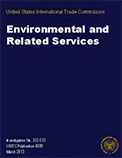
There are few trade barriers that apply specifically to the provision of core environmental services, but the removal of barriers affecting "related" services – including architectural, engineering, and construction services, among others – could increase trade in the environmental services sector, reports the U.S. International Trade Commission (USITC) in its new publication.
The report provides estimates of the U.S. and global markets for, and discusses barriers to, trade and investment in three core environmental services industries: water and wastewater services, solid and hazardous waste management services, and remediation services. The report also examines the critical role of several related services.
The USITC found:
- Between 2000 and 2010, revenues in the global environmental services market increased by 41 percent to $505.5 billion. Water and wastewater services accounted for 49 percent of the market in 2010, solid and hazardous waste services accounted for 32 percent, and remediation services accounted for 8 percent.
- The United States accounted for the largest share of the global environmental services market in 2010 (38 percent), followed by Western Europe (28 percent) and Japan (11 percent). Developing countries accounted for a very small share of the global market.
- While environmental services markets have grown in recent years due to factors such as population growth, increasing economic activity, regulation, and rising environmental awareness, trade continues to account for a very small share of revenues in these markets.
- The United States ran persistent trade deficits in water and wastewater services and solid and hazardous waste services during 2000-2010. In 2010, these deficits were approximately $2.4 billion for water and wastewater services, and $352 million for solid and hazardous waste services. By contrast, the United States posted a $245 million trade surplus in remediation services in 2010.
- Trade barriers affecting environmental services primarily include general investment restrictions and measures that impede the provision of related services.
- Results from a gravity model estimated by the USITC suggest that the reduction of certain regulations on architectural, engineering, electricity, and transportation services is associated with a substantial increase in sales by environmental services firms operating abroad.
View the publication at: http://www.usitc.gov/publications/332/pub4389.pdf


















